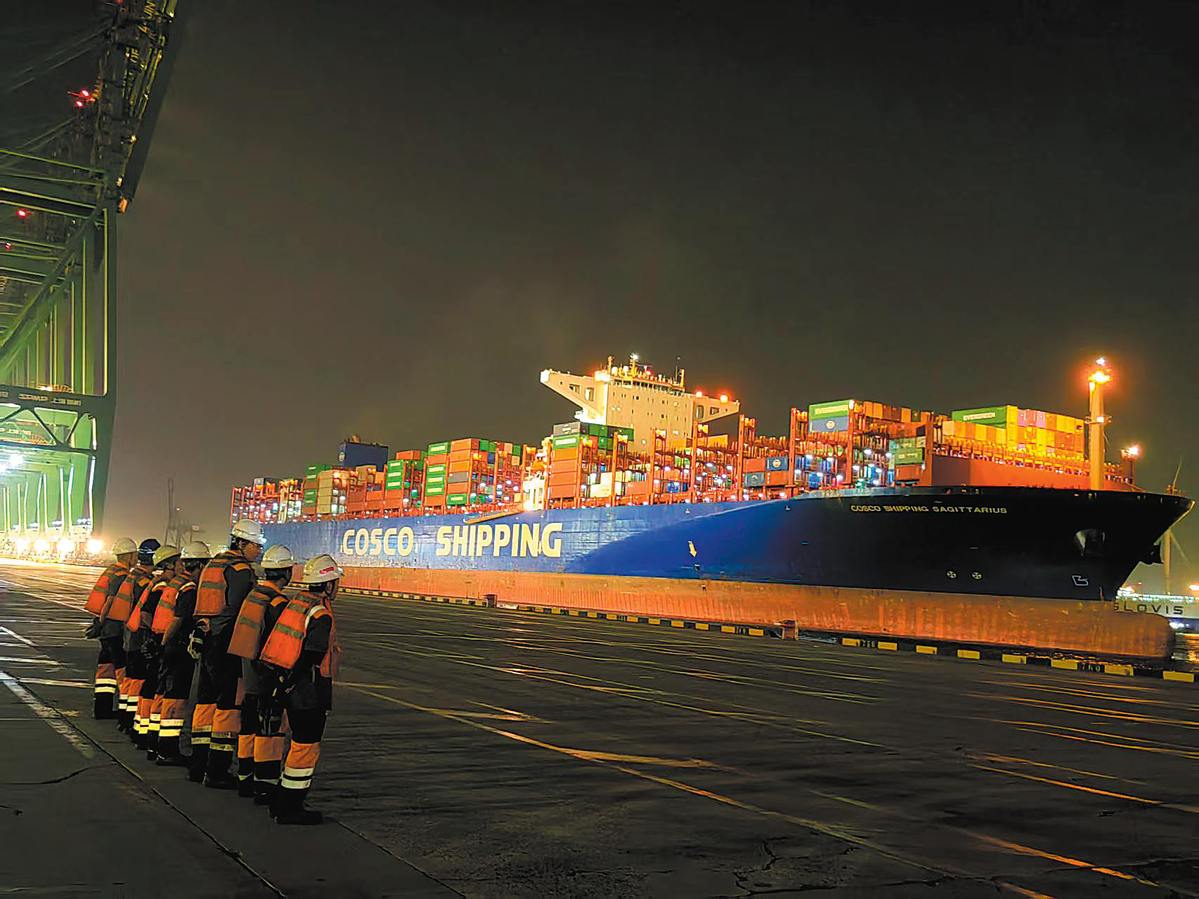Efficient sea-rail links: Tianjin Port shows hub role in SCO cooperation


The COSCO Shipping Sagittarius container ship carrying major components for the Airbus A320 family of aircraft that will be assembled in Tianjin, sailed from Europe and docked at the Tianjin Port Pacific International Container Terminal on Aug 10.
It took dock workers 40 minutes to unload the components, down from two hours when the first batch arrived 17 years ago, while the annual frequency of such A320-related deliveries has grown from four to 68.
Li Wentao, deputy manager at TPCT's operation management department, said the team had developed an "Airbus TCU Receiving and Unloading Process Quality Plan "through years of practice, achieving 100 percent operational accuracy and reducing the average unloading time per component by 12 percent.
"Tianjin is not only an important seaport in northern China, but also a critical junction of multiple national strategic corridors," said Lyu Bo, a professor at the School of Economics of Tianjin Normal University. "The city has the natural endowment to become a 'super node' for the global flow of production factors."
In May, the first China-Europe (Central Asia) freight train departing from Tianjin Port via Horgos land port to Uzbekistan was launched. Fifty containers of goods shipped from the Republic of Korea were transported within two weeks to Sergeli Logistics Park in Tashkent, capital of Uzbekistan. Compared with previous routes, this direct sea-rail train to Central Asia shortens the journey by 800 kilometers.
In the first quarter, Tianjin Port handled 5.713 million twenty-foot equivalent units of containers, up 5.6 percent year-on-year and hitting a record high for the same period. Cargo throughput reached 119 million metric tons, up 1.4 percent year-on-year.
"For many years, Tianjin Port Group has made full use of its geographical advantages, vigorously developing China-Europe and China-Central Asia freight train services, and ensuring smooth trade channels between China and other Shanghai Cooperation Organization member states," said Kong Weidong, deputy general manager of Tianjin Port Group Logistics Co Ltd.
At present, Tianjin Port maintains shipping trade with more than 500 ports in over 180 countries and regions and has deepened railway cooperation with SCO countries including Russia, Kazakhstan, Uzbekistan and Belarus. The launch of sea-rail intermodal trains has made Tianjin an important hub connecting SCO countries with global markets.
Supported by trunk railways such as the Beijing-Shanghai and Beijing-Harbin lines and a well-developed expressway network, goods from Central Asia and northern China can directly reach the port. From there, they are shipped worldwide through deep-water channels and extensive international routes. At the same time, imports can also be quickly transferred and distributed to the inland market.
According to the General Administration of Customs of China, in the first seven months of this year, China's trade with other SCO member states reached 2.11 trillion yuan ($295 billion), up 3 percent year-on-year and hitting a record high for the same period. In the first half of this year alone, Tianjin Customs supervised 365 China-Europe (Central Asia) freight trains carrying 39,000 TEU, both up 18.4 percent year-on-year.
"As a key intersection of the Belt and Road Initiative and the eastern starting point of the Eurasian Continental Bridge, Tianjin will play an important hub role in expanding China's cooperation with SCO member states," said Han Fuqian, deputy director of the Tianjin Municipal Transportation Commission.
Sheradil Baktygulov, director of the Institute of World Politics in Kyrgyzstan, said after visiting Tianjin Port, "Thanks to the China-Europe (Central Asia) freight trains connecting SCO countries closely with China, Tianjin can serve as an important 'seaport' for Central Asian countries."
In recent years, China has been working to optimize the business environment at its ports. The State Council has issued a series of documents, stressing the need to cut clearance times, reduce corporate costs and improve cross-border logistics efficiency. To further support Tianjin enterprises in trade with SCO member states, the city has been advancing institutional innovation and rolling out facilitation measures.
To support product exports, Tianjin Customs issues authorized economic operator certificates to companies with the highest credit ratings. "With the certificate, companies can enjoy priority processing, fewer inspections, optimized services and 49 additional joint incentives from other government departments, effectively lowering export costs, improving logistics efficiency and enhancing international recognition," said Cai Xuehai, director of the enterprise management and audit division of Tianjin Customs.
In the import process, Tianjin has also been innovating clearance models. In recent years, Tianjin Xingang Customs has set up a dedicated multimodal transport service window, providing full-process guidance and "one-stop" services, while establishing a fast declaration system of "report upon arrival, review and release immediately".
"By promoting the 'fast-track Customs clearance' model for China-Europe freight train exports, procedures have been streamlined so that outbound trains can be released within two hours upon arrival at the port," said Dong Na, deputy section chief of the multimodal transport division of Tianjin Xingang Customs.
In recent years, overall clearance time at Tianjin Port have been cut by more than half, with the average clearance times for imports and exports reduced to about 36 hours and 1.8 hours, respectively. New models such as "direct pickup at the ship side" and "direct loading upon arrival" are being expanded, helping enterprises save significantly on logistics time and costs. With efficiency on the rise and more open business models clustering at the port, Tianjin is becoming a solid platform for companies to explore the SCO market.
"Tianjin Port is not just a harbor, but also a driving force for industrial growth," said Zhang Jiang, deputy general manager of the business department of Tianjin Port Co Ltd. "We will seize the important opportunity of hosting the SCO Summit in Tianjin to enhance trade connectivity with member states, accelerate cargo flows and promote international cooperation in shipping and logistics, further consolidating Tianjin's role as a regional hub of opening-up."
Wei Qianqian contributed to this story.




































